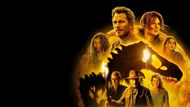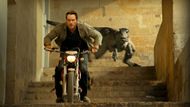Jurassic World Dominion intensifies the original Jurassic Park tragedy by extending its ramifications into the entire world, where the unchecked coexistence of humans and dinosaurs magnifies the themes of ecological devastation, scientific arrogance, and sudden brutality. The sixth installment in the saga does not simply retrace the destructive history of Hammond’s park, but reveals how the irresponsible reintroduction of prehistoric animals is ongoing to destroy ecosystems and disrupt human communities across the globe.
While the original Jurassic Park had only its nightmare on one remote island, with warnings of genetic recklessness and corporate greed, Jurassic World Dominion escalates the horror by allowing dinosaurs to roam freely across all sorts of habitats, including city life. The outcome is a widening of the tragedy from a closed-system disaster to becoming an enduring global crisis.
In addition to the broadened scope, Jurassic World Dominion brings back familiar faces of the original trilogy and also incorporates new characters, which, in effect, connects the nostalgic heritage of the franchise with its present-day aspirations. The storylines deal with the consequences of the previous anarchy, illegal dinosaur smuggling, genetic manipulation, corporate corruption via BioSyn Genetics, and change the initially isolated tragedy into an international conflict with much greater stakes.
We will address how the savagery, ecological instability, and human error of the film contribute to the weight of the original tragedy, making the consequences of reviving extinct species more haunting and unavoidable.
Disclaimer: This article is based on the writer's opinions. Reader discretion is advised.
Jurassic World Dominion: Expanding the Jurassic Park tragedy globally

Jurassic World Dominion opens up the island-bound catastrophe of Jurassic Park into a global one, where dinosaurs collide head-on with human existence on distant continents. Narrative jump brings up fresh threats and moral issues: species that were originally limited to parks are now threatening crops, animals, and even cities. Formerly, the chaos that was isolated is now an irreversible chain of events, a chilling prospect of how fast humanity’s manipulations can turn into ecological catastrophe and psychological turmoil.
At the heart of this escalation is BioSyn Genetics, which produces genetically modified locusts with Cretaceous DNA to sabotage world agriculture, becoming a hideous emblem of scientific arrogance. With the bioengineering accidents scaled to the planetary scale, the franchise transforms its fable of the human triumph over nature into a story of corporate exploitation.
By doing so, Jurassic World Dominion stands on the same side as the warnings of Michael Crichton: science as a commodity, innovation that lacks vision, and a species so willing to tamper with powers beyond its control. The new global framing guarantees that the tragedy reverberates all the way through economies, ecosystems, institutions, and everyday lives beyond the closed borders of Isla Nublar.
Increased brutality and the harsh realities of genetic engineering

This installment does not hold its punches. Jurassic World Dominion sets its teeth in the violence and the painful after-effects of meddling with nature, exacerbating the tragic undertones of the saga. There are brutal human deaths that remind us that the stakes of careless genetic tinkering are not purely theoretical, but bloody. Where in other sequels survival was softened, in this one, death is clear and inevitable.
The destiny is vile, the ugly death of Lewis Dodgson at the fangs of dilophosaurs is poetic justice. While ordinary victims of the dinosaur attacks confirm the cruelty of this new world. The tonal contrast in favor of visceral carnage makes it obvious that unchecked ambition and greed have a human cost.
These scenes require contemplation, not mere spectacle, and challenge the viewer with the actual price of meddling with the design of life. They reintroduce the seriousness that was watered down in the earlier versions, making the franchise more critical of scientific overreach.
Character arcs and revisiting legacy themes

Through Jurassic World Dominion, the franchise brings back its most recognizable characters: Ellie Sattler, Alan Grant, Ian Malcolm, and entwines them into the world of new characters, as a means of anchoring the original tragedy to all the fallout surrounding it. Their presence introduces the continuity as well as the philosophical echo, reviving past themes of chaos theory, ecological vulnerability, and the dangers of uncontrolled science.
These veterans are now struggling not only to survive but also to face the moral consequences of their own involvement in events of the past. The responsibility of their arcs implies that the disaster of Jurassic Park has not been forgotten but resonates even decades later across continents. The weight of earlier decisions haunts the story beyond spectacle.
The new threads, such as black-market dinosaur trafficking or corporate biotechnological conspiracy, expand the scope of the story’s web, supporting the idea of greed and hubris as an inexhaustible force driving the crisis on.
Ethical implications and bioengineering consequences highlighted through storytelling

Continuing the bioethical provocations of Michael Crichton, Jurassic World Dominion takes the discussion to a new level with genetic manipulation seen at a global level. The discovery of Maisie Lockwood as an illegally cloned human being intensifies the issues of scientific limits and ethical restraint. It challenges the viewer to consider the morality of creating life on a whim or being able to control life.
The locust plague created by BioSyn, which destroys all crops across the world, brings home the disastrous consequences of corporate interference in the ecosystems in the name of profit. The plot draws upon current-day existential fears of genetically altered life, unregulated biotech, and environmental danger, making it a speculative fiction that serves as an allegory of contemporary debates.
By doing so, the film swings beyond the popcorn thrills, embedding the darker heritage of the film in an intellectualizing critique of science in the hands of corporations and the shortcomings of the systems keeping human society afloat.
Industry perspectives and audience reception of a darker Jurassic Park tragedy
As noted by industry observers and critics alike, Jurassic World Dominion manages to accomplish this in parts by shedding more light on the original tragedy, especially the bioethical questions and the increased stakes it poses. However, the reviews are split, with some saying that it takes a wander through its pacing and structure, as though the movie is afraid to accept the seriousness of its own thoughts.
As the Evening Standard review notes:
"Trevorrow, who did such a fine job with Jurassic World, definitely struggles with pacing this time round."
The reunion of the original cast with new arcs creates both a bridge between nostalgia and a new direction, and is widely praised as respectful to the roots of the franchise. Nevertheless, critics observe that there are lost chances, moments in which the story could possibly have taken a step further into the ecological and moral implications it so eloquently brings to mind.
A Reddit user writes:
"It felt like a huge missed opportunity to dive deeper into the ethical implications of dinosaurs living in the wild and the real-world consequences of cloning—something the first movie did so well."
Audiences also note ambivalence: some praise the narrativity of its more somber tone, the spectacle of its visual effects, and the gut-punch of its deaths, and others complain of narrative digressions that diminish depth. The struggle of the blockbuster thriller versus a philosophical exploration is still felt.
However, the film has found a chorus within the industry, sparking debates about the ways in which mainstream franchises would have a role to play in depicting science and environmental danger.
Eventually, Jurassic World Dominion is more than a sequel. It is a case study of the ways legacy franchises can be adapted to reflect cultural fears, redefining entertainment as a means to wrestle with ethical, ecological, and existential stakes.
Also: From Jurassic Park to Jurassic World: Dominion: Where to watch every film in order
Love movies? Try our Box Office Game and Movie Grid Game to test your film knowledge and have some fun!
